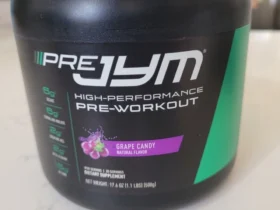
17 Health Benefits of Ginger Root & Ginger Tea
If you’re trying to set out on the path of the healthy eater, the first thing you need to know is that there are just as many, if not more, health foods than there are junk foods.
The ’health’ foods come in the form of natural, unprocessed fruits, vegetables, and herbs, all of which have been in use for millennia in the art of healing in addition to general healthy eating.
Of the many super foods out there, one of the most powerful is ginger, that sharp-tasting root from the Far East that is often found next to your wasabi when you order sushi.
The ginger root that we all know and love is actually the underground rhizome of the ginger plant, and can be red, yellow, or white in color (although the one you’ll most often encounter is yellow).
It’s covered in this thick brownish skin that must be removed before consumption, and adds a very specific (sometimes spicy) kick to any meal.
As well as being a flavorful addition to most dishes, ginger is also, and most importantly, a healing agent, and something you should seriously consider eating more of.
Don’t believe me? Here’s the proof.
#1 Cancer Preventative

Cancer is a disease involving rapid, damaging cell growth. It varies in severity, depending on the kind of cancer you have, its location, and the stage it’s in.
Unfortunately, cancer has become a relatively common ailment. It is not curable, but it is treatable, with Chemotherapy and surgery as options that have seen varying levels of success.
In addition to those tested methods of western medicine, ginger consumption might also help. There is a compound found in raw ginger called 6-gingerol, which has anti-inflammatory, anti-bacterial, and anti-tumor properties.
Studies have found that this compound can fight, and maybe even prevent, lung, colon, prostate, ovarian, breast, skin, and pancreatic cancers. Ginger can also aid in the destruction of cancerous growths, as well as prevent their existence in the first place.
At the very least, ginger is known to ease some of the symptoms of chemotherapy, including nausea.
#2 Fights Alzheimer’s

Alzheimer’s disease is a progressive brain disorder in which the brain cells degenerate and die, resulting in memory loss and dementia. It is a common bane of the elderly, though it could strike earlier if you have a history of Alzheimer’s in your family.
Research has found that, because of the high antioxidant levels and compounds found in ginger, the root can actually help slow down the degeneration of your brain cells, while reducing inflammation in the brain.
Studies have also found that ginger promotes sharper brain function. As a preventative to neurological degeneration, ginger has been proven to work, lowering the severity of Alezheimer’s and decreasing your risk for dementia.
#3 Relieves Arthritis

That same compound I mentioned earlier, gingerol, as well as another compound, shogaul, that are both found in ginger, are loaded with anti-inflammatory properties.
Arthritis is a condition that involves moderate to severe joint-inflammation. There are over a hundred types of arthritis, but all involve inflammation.
There are many parts of your diet that can exacerbate the joint pain that is indicative of arthritis, including too much sugar or gluten, both of which are powerful inflammatory foods. But the addition of ginger into your diet can reduce your arthritic pain, discomfort, and stiffness, thanks to gingerol.
The studies back this up, reporting that those who took a ginger supplement experienced less pain, and as such, took less pain medication. Arthritis is a frustrating, uncomfortable disease, but ginger might be a method that can ease your suffering.
#4 Eases IBS

Irritable Bowel Syndrome (IBS) is a chronic disease that targets the large intestine. Symptoms include cramping, stomach pain, bloating, and constipation, and can vary in severity on a case to case basis.
The anti-inflammatory effects of ginger are believed to help ease some of the pain, while also strengthening your stomach lining, helping to make the condition easier to handle.
Ginger tea is a good way to consume ginger to help your IBS, as hot liquid helps ease your bowels and promotes easier bowel movement.
#5 Facilitates Digestion

Whether or not you have chronic indigestion, irregular bowel movements can result in abdominal pain and discomfort.
Ginger has certain properties that actually speed up your body’s ability to empty your stomach. Basically, ginger helps to speed up your digestive processes, which can ease chronic indigestion, as well as general pain from random flare ups of indigestion.
Interestingly, as a result of this sped up digestion, you will find yourself to be more energized, as much of your body’s energy is focused on metabolic processes.
#6 Relieves Gas

Although it sounds minor, having severe gas can be embarrassing and sometimes painful. It is always something to avoid or prevent, if possible. In keeping with the digestive properties of ginger, it actually helps relieve gas.
There are a few products out there that are designed to relieve gas, but none work quite so well as ginger, which is because of its ability to ease and smooth digestion.
Drinking a cup of ginger tea at night will allow the root to work its magic overnight, and you’ll wake up feeling much better.
#7 Relieves Heartburn

Ginger may also be able to help with heartburn, that uncomfortable and sometimes painful burning that results from acid reflux.
Ginger helps in two ways. One, because of its phenolic compounds; it has been established that ginger helps relieve gastrointestinal discomfort and contractions, which helps reduce the flow of acid into your esophagus.
Ginger also is a known anti-inflammatory; inflammation in the esophagus is a key aspect of acid reflux and heartburn.
The properties of ginger in fighting heartburn are clear, but medical research as to whether ginger can specifically help with heartburn isn’t there.
It’s just a good additional method you might want to try out, if you’re at your wits end with other medicine because nothing seems to be helping.
#8 Promotes Weight Loss

Obesity has become something of a plague in America. The numbers of obese children and adults are staggering.
There are many people out there trying to lose weight, and for many, it’s not easy. Genetics have a hand in this, as well as the influx of unhealthy, yet easily available food on the market.
Now, the research is a little murky, but a few studies have found that ginger may assist weight loss.
This does not mean that forcing down your daily mug of steaming ginger tea will simply melt off the fat, however. When combined with a healthy lifestyle; regular exercise and healthy eating, ginger might provide a little help.
It helps make you feel full for longer, which obviously reduces your chances of overeating, something that is a consistent cause of obesity.
Just don’t rely on this little root to do all the work for you. Alone, it won’t do anything to shrink your figure. You have to be eating and living healthily to see these additional results.
#9 Aids in Appetite Suppression

Appetite suppression makes up a potentially vital portion of the mission to lose weight. The less hungry you are, the less you’ll eat, and the easier it will be to lose the pounds.
Again, the research here is minimal and a little shaky, but that doesn’t mean you shouldn’t try it out.
Some small studies have found that consuming small amounts of ginger powder have resulted in a reduced appetite and increased fullness.
The reasons for this are not known for sure, though it is suspected that these results are due to the stimulating effect ginger has on your digestive system.
#10 Maintains Healthy Blood Sugar Levels

This one has the backing of more solidly established research. Diabetes is a common and frustrating condition around which your blood cannot properly process glucose.
Ginger may be able to help. Studies have found that ginger is able not only to reduce blood sugar levels, but also to regulate insulin responses.
This could be potentially huge for someone struggling with diabetes, as a more regulated insulin response vastly reduces the scope of the condition.
That, coupled with a reduction in blood sugar levels, may bring us somewhat close to making this disease practically curable.
As if this was not enough, some research has also found that ginger may be able to help protect the heart against issues resulting from diabetes.
Just speak with your doctor before you start going really ginger crazy.
#11 Treats Nausea and Morning Sickness

Ginger has a long history, specifically in Asia, of being used to treat a variety of ailments, including nausea and stomach aches.
The studies may be a bit lacking, but most available information suggests that ginger may be highly effective in combating many forms of nausea, including morning sickness, nausea resulting from chemotherapy, and post-surgery nausea and vomiting.
This is due to those gingerols and shogaols that I mentioned earlier. These compounds relax the intestinal tract and slightly alter your biochemical pathways, thereby reducing (for a brief period of time) nausea.
#12 Reduces Muscle Soreness

If you’ve worked out before, you will be very familiar with the general bodily soreness that accumulates in the muscle group you targeted.
Depending on how in-shape you are, and how hard you worked out, as well as how well you hydrated, this soreness could potentially last for days.
Ginger, as you know by now, is a powerful anti-inflammatory. Muscle soreness is a form of inflammation.
As such, several studies have found that consuming small amounts of ginger daily will reduce the day-to-day buildup of muscle soreness.
The effects will not be immediate, and they might even go unnoticed. But it will help, even minimally, which allows you to go harder for longer.
#13 Reduces Menstrual Pain

Menstrual cramps and period pain can, for some women, be incredibly uncomfortable at the very least, and, at the worst, be severely painful.
Research has found that ginger may reduce and prevent period pain and menstrual cramps, and even might be able to reduce heavy menstrual bleeding.
We already know that ginger is an anti-inflammatory. But ginger not only reduces inflammation, it prevents and protects against it.
This protection inhibits the body’s production of prostaglandins, which is a chemical that aids in the contraction of the uterine muscles.
There is a strong link between prostaglandins and worsening menstrual cramps, which makes ginger even more valuable.
If it can reduce the production of prostaglandins even minimally, the result will be far less pain and discomfort.
#14 Lowers Blood Pressure

One of the most significant banes to the American lifestyle is hypertension, more commonly known as high blood pressure.
Due to the fast food, junk food, sodas, burgers, and more, that are all hallmarks of a standard American diet, blood pressure has become a legitimate crisis.
When untreated, hypertension can be incredibly damaging to your body, specifically your brain and your heart.
Research has found that ginger, when used in conjunction with medication, aids in the reduction of blood pressure by helping to expand your blood vessels.
Larger blood vessels lead to better circulation, which reduces blood pressure. Further, ginger contains levels of potassium, something that has been found to aid in the reduction of blood pressure.
Ginger actually contains a higher concentration of potassium than bananas.
Again, as is often the case, ginger alone won’t solve hypertension. When combined with prescribed medication, you’ll see better results.
#15 Lowers Cholesterol

Hand in hand with high blood pressure for the average American is high cholesterol. High levels of LDL (the bad) cholesterol increases your risk of heart disease.
Some studies have proven, rather significantly, that ginger powder, taken daily, results in noticeable reductions in most cholesterol markers.
The studies also found reductions in blood triglycerides. It is important to never be reliant on one method to reduce your cholesterol. You should eat healthy and exercise, while specifically avoiding foods that contain LDL cholesterol.
On top of that, adding small amounts of ginger to your daily diet will make your markers look even better.
#16 Fights Infection

In addition to fighting cancer and Alzheimer’s, ginger also contains certain compounds that are known to help fight infection.
I’ve already mentioned the compound I’m referring to here; gingerol. This magical compound works to inhibit the growth of several types of bacteria, specifically oral bacteria.
As such, ginger works as a powerful preventative measure against gingivitis and periodontitis.
There is also some evidence that ginger may be an effective agent against the RSV virus, a virus that is commonly at the root of respiratory problems and diseases.
While a lot of theories about the powers of ginger are still lacking enough evidence for them to become medically sound, this one is consistent and legitimate.
#17 Antioxidant

Antioxidants prevent oxidation, a chemical reaction that produces free radicals that can lead to cell damage.
Anything with antioxidant properties prevents oxidation, thereby protecting cells from potential damage. Thanks to its chemical makeup, ginger is a root with powerful antioxidative properties.
The compounds I am referencing specifically are gingerol, paragols, and shogaol. These three compounds are those namely responsible for ginger’s ability to ease digestion, as well as its ability to reduce inflammation.
Anything with legitimate antioxidant properties is a good idea to add to your diet. Ginger happens to have highly concentrated amounts of these compounds that work to prevent oxidation.
How To Consume Ginger?

When buying ginger, it is always best to go fresh, when you can. Fresh ginger has higher levels of gingerol (and it tastes better, too).
Most grocery stores should sell ginger. When you’re selecting your optimal piece, feel for a firm, smooth chunk, that does not have any slimy, soft, or moldy parts on it.
You can also get crystallized, powdered, and candied ginger.
When preparing ginger, you first have to peel it. The best way to do this is with a spoon.
Simply hold the ginger root in your non-dominant hand and grip the spoon with your dominant hand and scrape it along the root. The skin should come right off. (When peeling, it is sometimes easier to chop the branches into more manageable pieces).
Once it’s all peeled, there are a variety of ways to implement it into your diet.
Minced ginger is a great addition to a bunch of different dishes. A favorite of mine is sauteed green beans with pine nuts, minced garlic, shallots, and minced ginger. A little teriyaki glaze wouldn’t go amiss here either.
Finely minced or crushed ginger is also great in marinades for meat or veggies.
It may sound a little strange, but if you have a juicer, try throwing some ginger in with kale, spinach, and apples. It might not taste amazing, but juiced vegetables are a fantastic daily health drink.
To Sum it up
The advancements of western medicine have successfully shrouded most time-tested strengths of ancient medicine and healing, which focused on natural herbal treatments.
Ginger is one of those ancient treatments. And while western medicine is a good thing in a lot of ways, sometimes the simpler route leads to a better solution.
Ginger is one of those alternative healing methods that isn’t strong enough on its own, as too much ginger can lead to heartburn and diarrhea. But the right amount, no more than 3-4 grams per day, can help you in so many ways.
The big ones involve cancer treatment and nausea prevention, but because of the antioxidant properties in ginger, its healing abilities range much farther than just those two.
Worst case scenario, you spice up your daily meals. Best case, you prevent cancer and Alzheimer’s, reduce inflammation, and generally discover a healthier, happier, and more comfortable life.

Article by:
Daniel DeMoss
I’m a personal trainer based in Denver (Matrix Gym) and a true fitness nerd. If I’m not training clients or working out at my home gym, I’m probably skiing, cycling or hiking with my dog Rufus.
Get in touch: daniel@dumbbellsreview.com








Leave a Reply